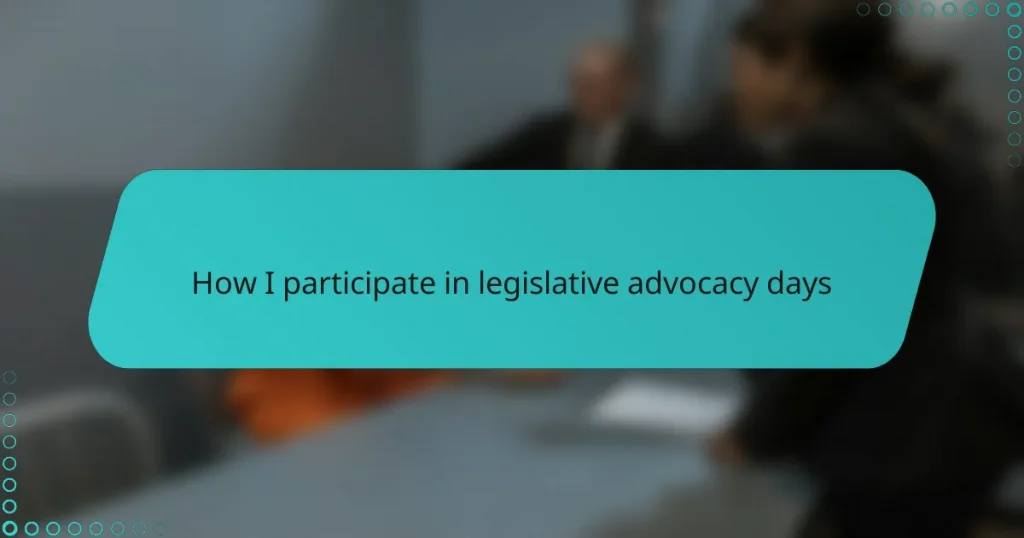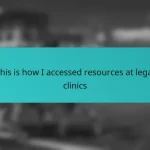Key takeaways
- Legislative advocacy empowers individuals to influence laws by sharing personal stories and experiences that highlight community needs.
- Effective advocacy requires clear messaging, preparation, and active engagement with lawmakers through respectful dialogue and listening.
- Building personal connections with legislators through heartfelt anecdotes can significantly impact their understanding and decision-making.
- Following up after advocacy days with thank-you notes fosters lasting relationships and keeps the dialogue open for future interactions.
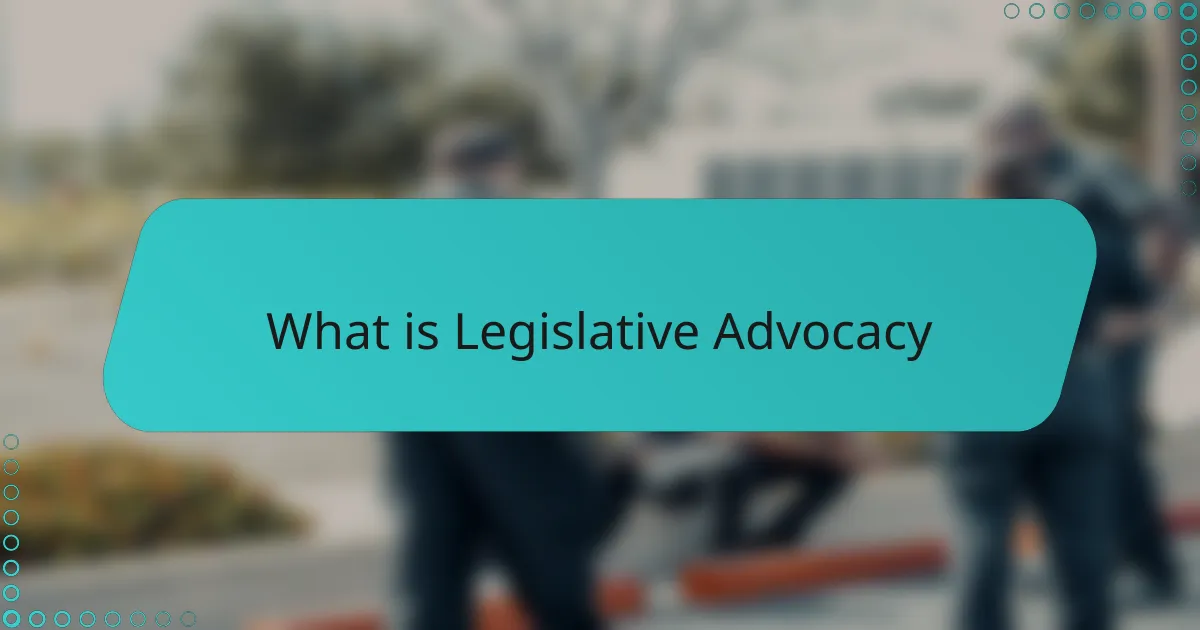
What is Legislative Advocacy
Legislative advocacy is essentially the art of influencing lawmakers to create or change laws that affect people’s lives. I find it fascinating how this process empowers ordinary individuals, like you and me, to have a voice in shaping policies. Have you ever wondered how laws truly reflect the needs of the community?
From my experience, legislative advocacy involves not just speaking up but thoughtfully presenting facts, stories, and solutions to those in power. It can be as simple as sharing a personal story that highlights why a certain law matters or as complex as organizing a campaign to push for change. This personal connection often fuels my passion in these efforts.
What makes legislative advocacy so powerful is its potential to create real-world impact. When I engage in advocacy, I see firsthand how conversations with legislators can turn into meaningful actions. It’s a reminder that democracy thrives when we all participate actively.
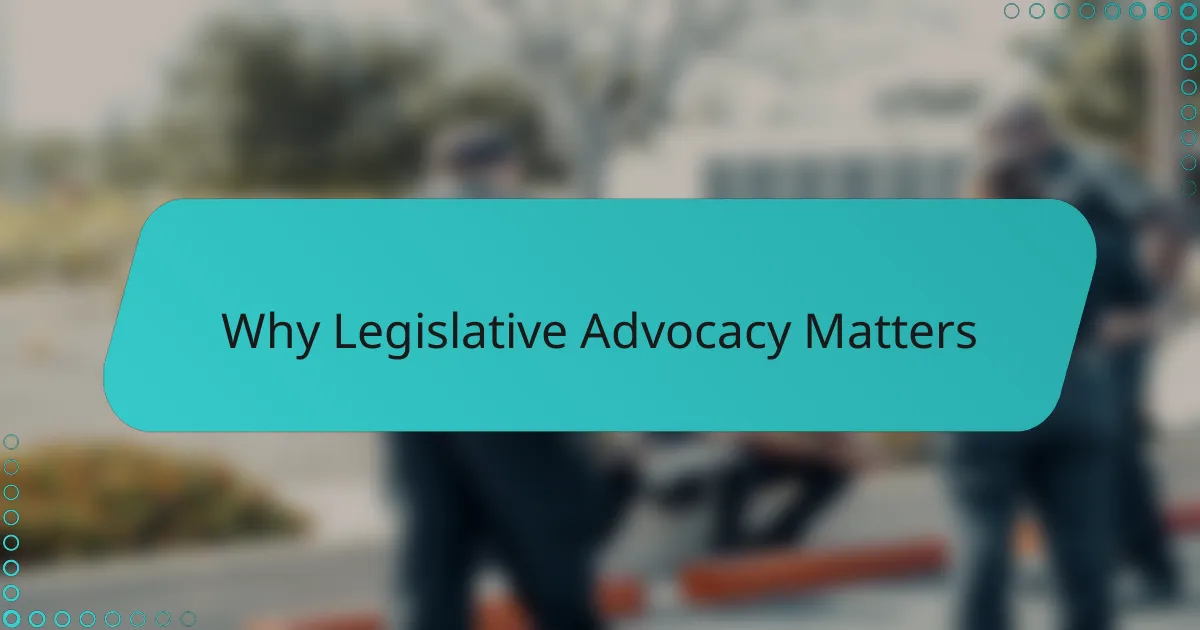
Why Legislative Advocacy Matters
Why does legislative advocacy matter so much to me? Because it’s where voices meet action. When I’ve shared my story during advocacy days, I’ve felt the weight of possibility—that one conversation can ripple into changes that affect many lives, including my own community.
I often wonder, why do some laws fail to consider real people’s needs? Advocacy bridges that gap. It’s more than policy jargon; it’s about ensuring laws reflect lived experiences. From what I’ve seen, legislators respond best when they see the human side behind the statistics.
The beauty of legislative advocacy lies in its accessibility. You don’t need to be an expert or hold a title. When I get involved, I remind myself that my personal perspective holds value. This understanding keeps me motivated and hopeful that real change is possible, one voice at a time.
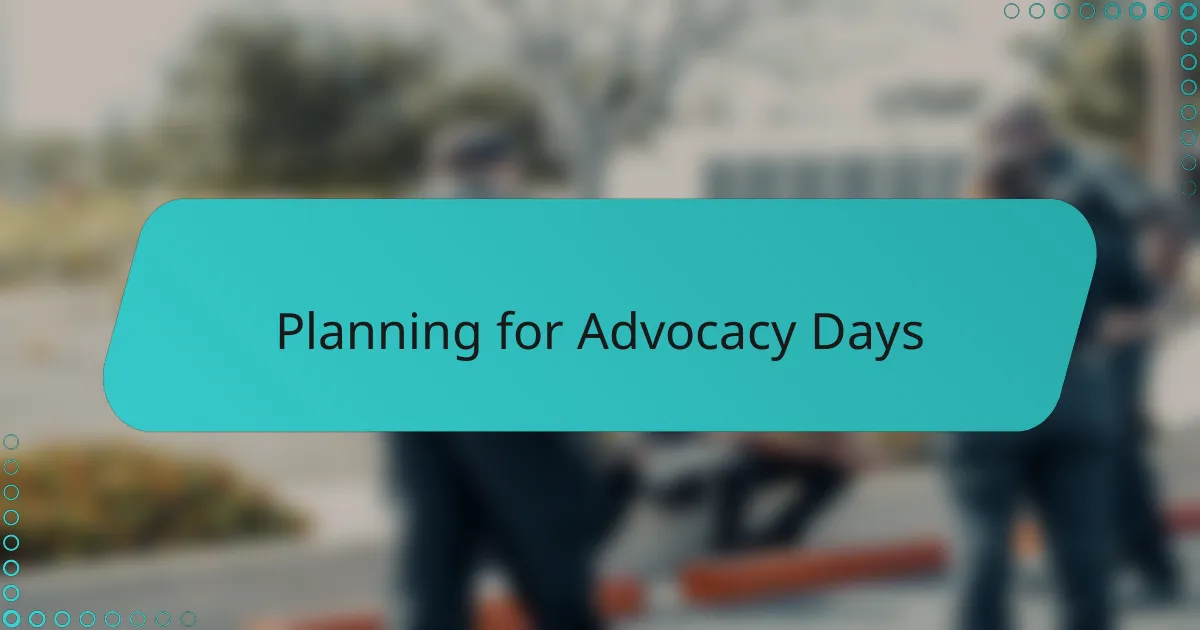
Planning for Advocacy Days
Planning for advocacy days always starts with a clear strategy. I ask myself, what key message do I want to convey, and who exactly needs to hear it? From experience, pinpointing the core issue helps me stay focused and makes my conversations with legislators more impactful.
I’ve learned that preparation goes beyond knowing the facts. Rehearsing my talking points and anticipating questions build my confidence, so I don’t get overwhelmed in the moment. Have you ever stumbled over your words when nervous? Practicing in advance really changed the game for me.
Scheduling meetings is another crucial step. I make sure to book them early and confirm details a day before—nothing worse than showing up to an empty office. These little logistics might seem tedious, but they signal respect for the legislator’s time, which I believe helps establish a more productive dialogue.
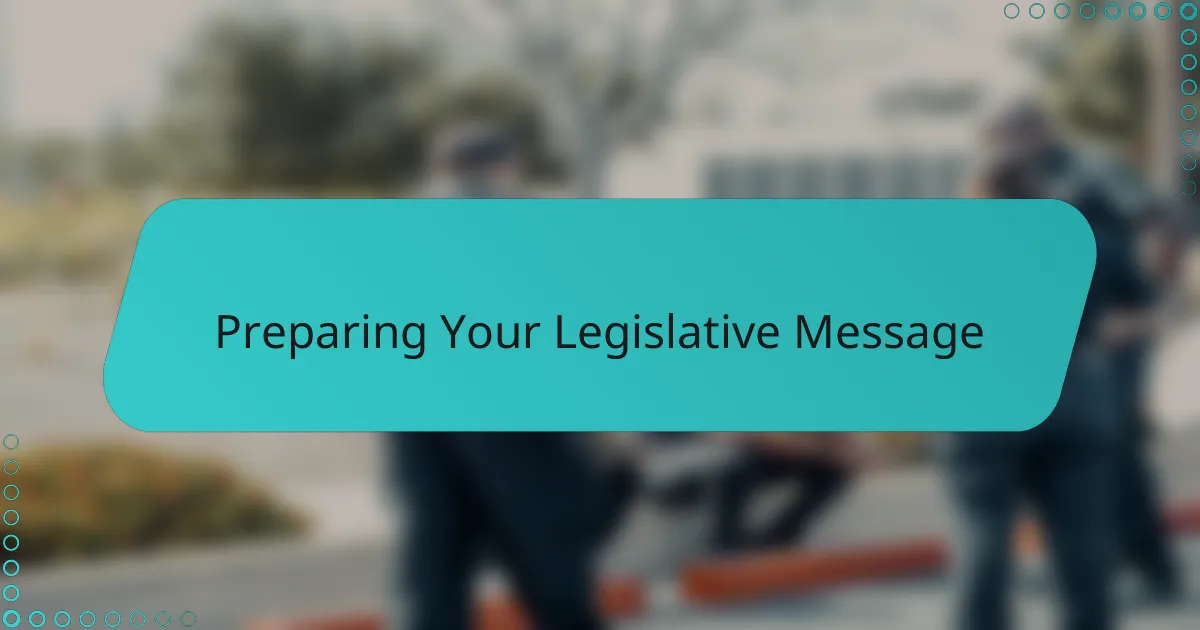
Preparing Your Legislative Message
Crafting my legislative message always starts with asking: what is the one thing I want the lawmaker to remember? This focus is crucial because I’ve seen how a clear, concise message holds attention better than a scattered set of facts. When my message is sharp, it feels like I’m offering a gift—a key insight that can actually influence decisions.
I also think about who I’m speaking to and tailor my message accordingly. I remember once adjusting my approach mid-conversation because I sensed the legislator connected more with personal stories than statistics. That little shift made all the difference and reminded me how flexible messaging needs to be to truly resonate.
Have you ever tried distilling complex ideas into a couple of sentences? It’s tough but rewarding. Practicing my message out loud helps me find the right balance between passion and clarity. When I get it right, I feel prepared and confident to make my case effectively during advocacy days.
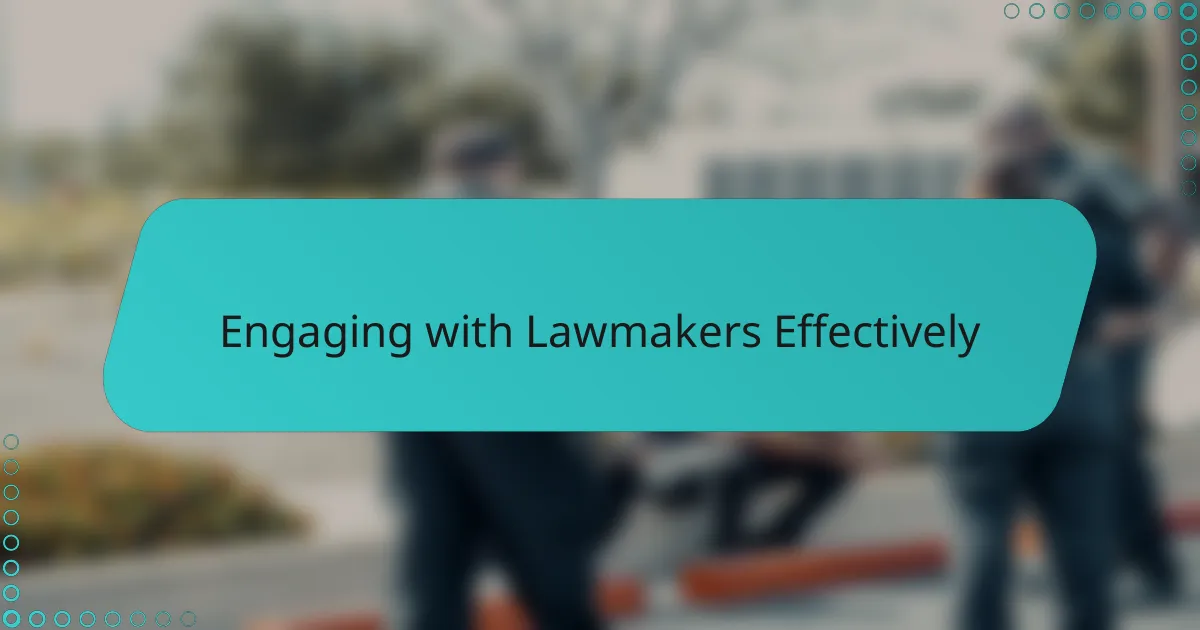
Engaging with Lawmakers Effectively
Engaging with lawmakers effectively means more than just showing up; it requires listening as much as speaking. I’ve noticed that when I ask questions and genuinely engage with their perspectives, it opens doors for more meaningful conversations. Have you ever felt that a simple exchange of ideas can build unexpected bridges?
Another thing I’ve learned is the power of respect and professionalism. Even when the conversation gets tough, maintaining a calm and courteous tone helps keep the dialogue constructive. From my experience, lawmakers respond best when they feel heard and valued, not pressured.
I also try to connect on a personal level by sharing stories that highlight the real impact of policies. One time, a legislator told me how a heartfelt anecdote shifted their view more than any statistic could. Isn’t it fascinating how human stories can sometimes move mountains in a room full of legal minds?
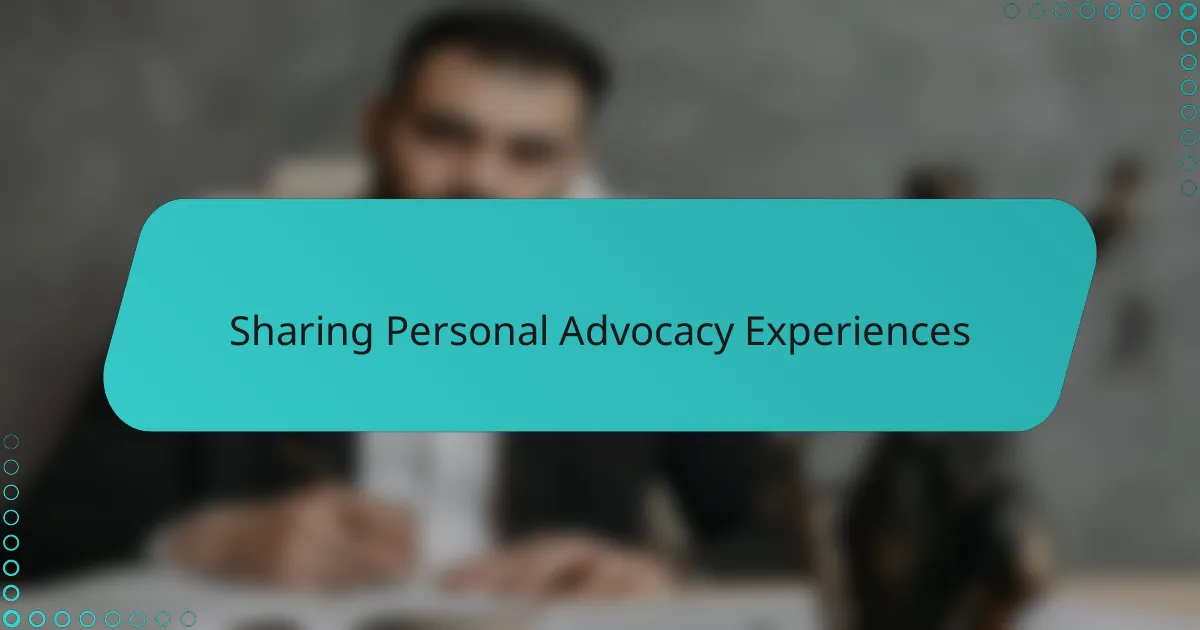
Sharing Personal Advocacy Experiences
Sharing my personal advocacy experiences often becomes the heart of my conversations during legislative advocacy days. I remember once sharing how a particular law affected a close friend’s family, and seeing the legislator’s attentive reaction made me realize just how powerful personal stories can be. Have you ever noticed how a well-told story can open doors that pure data sometimes can’t?
At times, sharing my own journey feels vulnerable, but it also builds a genuine connection. When I speak from the heart, I sense that lawmakers aren’t just hearing words—they’re feeling the real-life impact behind the policy. This connection fuels my motivation, making each advocacy day more meaningful.
I also find myself asking, “What can my experience teach others?” By sharing both successes and challenges, I hope to inspire others to speak up. From my perspective, these shared experiences create a community of advocates, each adding their unique voice to the conversation. Isn’t that what effective advocacy is truly about?
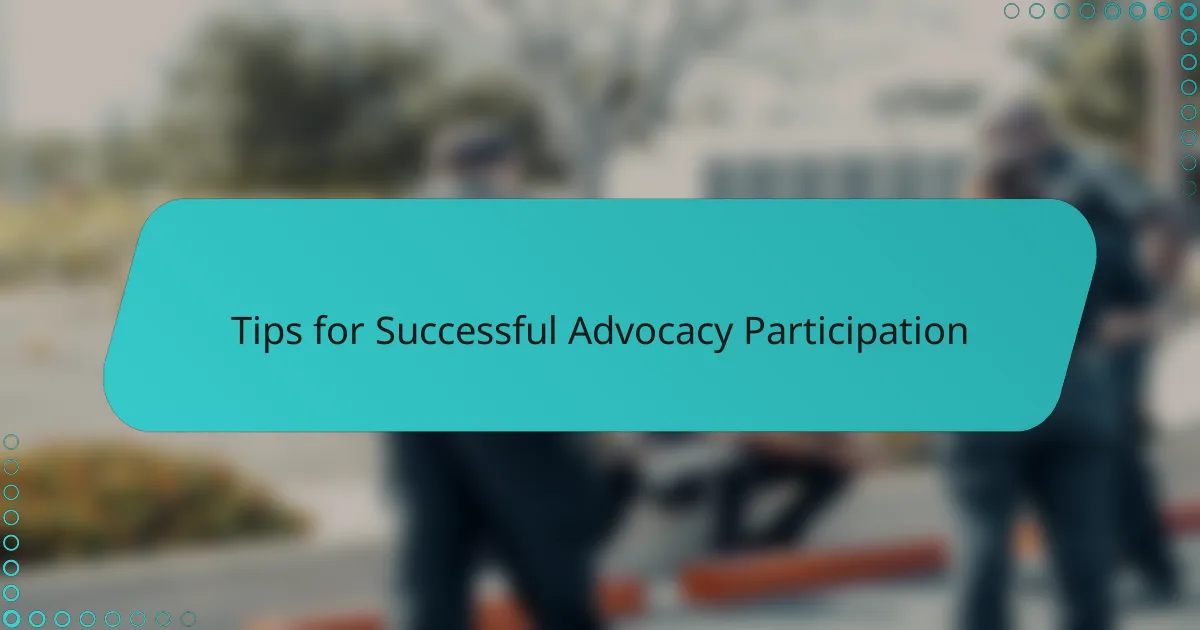
Tips for Successful Advocacy Participation
One tip I’ve found essential is to stay genuinely curious during advocacy days. Asking thoughtful questions doesn’t just show you’re engaged—it creates a dynamic exchange that can reveal common ground. Have you ever experienced how a well-placed question eventually opens up a whole new avenue in a conversation? That curiosity often leads to deeper connections with lawmakers.
Another thing I focus on is pacing myself. Advocacy can feel intense, especially when you’re passionate about the issue, but I’ve learned that keeping my energy steady helps me stay clear and persuasive. Sometimes, it’s tempting to rush through points, but slowing down allows me to listen and respond thoughtfully, which I believe makes my advocacy more impactful.
Lastly, I never underestimate the power of follow-up. After the advocacy day, sending a brief thank-you note or additional information keeps the conversation alive and shows professionalism. From my experience, those small gestures build lasting relationships that can be just as important as the meeting itself. Have you noticed how a simple follow-up can transform a brief encounter into ongoing dialogue?
